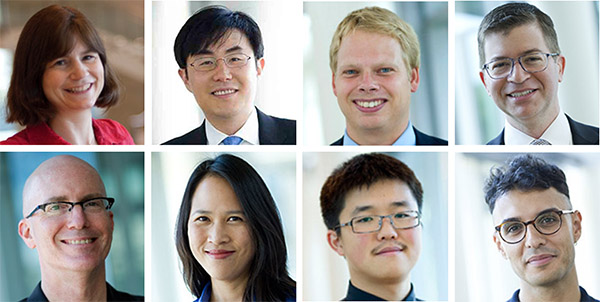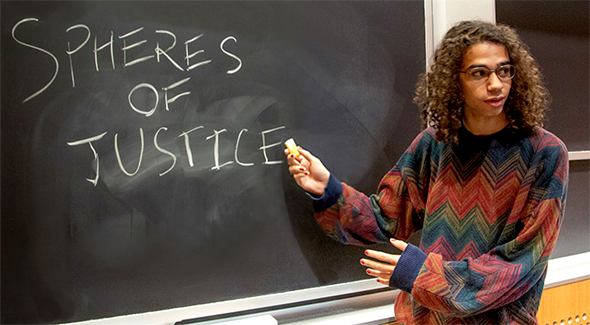COMPUTING AND AI: HUMANISTIC PERSPECTIVES FROM MIT
Political Science | Faculty of the Department

"The advance of computation gives rise to a number of conceptual and normative questions that are political, rather than ethical, in character. Political science and theory have a significant role in addressing such questions as: How do major players in the technology sector seek to legitimate their authority to make decisions that affect us all? And where should that authority actually reside in a democratic polity?"
Series | Computing and AI: Humanistic Perspectives from MIT
Q: What are some examples of domain knowledge, perspectives, and methods from political science that should be integrated into the research and curriculum of the MIT Schwarzman College of Computing (SCC) and why?
As computing transforms countless societal domains — including ethical norms, the regulatory environment, human rights, international cooperation, and the distribution of wealth and power in society — political scientists investigate the significance and impact of these ongoing changes.
As a discipline, political science has been a major contributor to the computational revolution in areas such as natural language processing, text analysis, network analysis, and the analysis of “big data." But the field also focuses on explaining the broader context in which data are constructed and analyzed — a burgeoning field one might call the “social science of computation.”
Studying the institutions and processes that generate data provides perspectives that are crucial for the effective and responsible use of data science. After all, data are socially and politically constructed; the predictions arising from artificial intelligence and machine learning are inexorably shaped by the processes that generated the underlying data. To be leaders in the application of computational techniques for the betterment of the nation and the world, the Institute’s researchers and students must also have a firm grasp of the deep significance of the data they analyze and a rich understanding of the implications of their findings.

Contributors
Top Row, L to R; Andrea Louise Campbell, Arthur and Ruth Sloan Professor of Political Science; In Song Kim, Class of 1956 Career Development Associate Professor of Political Science; Rich Nielsen, Associate Professor of Political Science; David Singer, Department Head, and Professor of Political Science. Lower Row, L to R: Charles Stewart III, Kenan Sahin Distinguished Professor of Political Science; Lily L. Tsai, Ford Professor of Political Science; Teppei Yamamoto, Associate Professor of Political Science; Bernardo Zacka, Assistant Professor of Political Science
"As a discipline, political science has been a major contributor to the computational revolution in areas such as natural language processing, text analysis, network analysis, and the analysis of 'big data.' The field also focuses on explaining the broader context in which data are constructed and analyzed — a burgeoning field one might call the 'social science of computation.'"
By working with students and researchers in other technical fields, political science has much to offer to ensure that computational research is socially aware, especially when it comes to interactions with governing institutions, the relations between nations, and human rights.
In addition to studying the societal and ethical implications of computation and artificial intelligence, one must also study the politics, which affect how computational advances are received and regulated. Just as different countries adapted differently to markets and capitalism, so too will their responses to computation vary depending on their political institutions, histories, and ruling ideologies. These factors will play a consequential role in shaping the future of computation.
Politics will also be transformed by computation. Already MIT political scientists are studying how automation changes the nature of work, how issues of cybersecurity are changing international relations, and how the availability of massive voter files alters political campaigns. As computational methods develop and more comprehensive datasets are amassed, a range of topics that political scientists have studied for decades will become relevant to those whose primary focus is computing.
While understanding the social context of computing often takes the form of study and research in ethics and moral philosophy, it is crucial to note that the advance of computation gives rise to conceptual and normative questions that are political, rather than ethical, in character. We see political science and political theory as having a significant role in addressing such questions as: How should we understand the new forms of power embodied in large-scale computation platforms? How do major players in the technology sector seek to legitimate their authority to make decisions that affect us all? And where should that authority actually reside in a democratic polity?

Jordan Isler, '19, Aerospace Engineering and Political Science major; class in Political Theory
Action
Incorporate the perspectives of political science to ensure that computational research is socially aware, especially with issues involving governing institutions, the relations between nations, and human rights.
"Computation and artificial intelligence are facilitating new discoveries in virtually every area of political science: persuasion, legislation, international trade, warfare, terrorism, elections, corruption and accountability, and social bias in algorithms, to name a few."
Such questions are political in character and cannot be resolved though moral philosophy. They pertain to theories of power, ideology, and legitimacy that have a long pedigree in political theory and political science, and that new developments in computation invite us to revisit in novel ways.
Thus, political science is central to the mission of the SCC. Our research applies computation to some of the most pressing problems facing society. It also looks beyond ethics to illuminate the politics of computation. When focused on the inputs of computation, our research emphasizes the fact that data are not “neutral,” but rather are formed through socio-political processes. When aimed at the outputs of computation, our research reveals how the spread of computation is changing our political life.
Q: What are some of the exciting, meaningful opportunities that advanced computing is making possible in your field?
Computation and artificial intelligence are facilitating new discoveries in virtually every area of political science: persuasion, legislation, international trade, warfare, terrorism, elections, corruption and accountability, and social bias in algorithms, to name a few. Along with developments in sister disciplines, this trend in political science marks the growth of “computational social science.”
The advent of computational social science coincides with a move in our department toward a lab model of research, reflected in the MIT Governance Lab, the Political Methodology Lab, and the MIT Election Data and Science Lab. Advanced computing capacity will facilitate the work of these labs and permit the extension of the lab model to other clusters of faculty and students who otherwise might not have the infrastructure to undertake ambitious, computationally intensive research projects.
Suggested links
Series | Computing and AI: Humanistic Perspectives from MIT
MIT Political Science
Research Labs
Affiliated Programs
MIT Schwarzman College of Computing
Contributors
Andrea Louise Campbell
David Singer, Department Head
Related Publications
MIT Department of Political Science celebrates 50 years of rigor, relevance, and impact
David Singer
David Singer named head of the Department of Political Science
Singer is a scholar of international political economy, a subfield of political science focused on international economic relations.
3 Questions: David Singer on China and the renminbi
MIT political scientist looks beyond the headlines about China’s new currency status.
Andrea Campbell
3 Questions: Andrea Campbell interprets the Supreme Court’s health care decision
A political scientist whose work was cited in one justice’s opinion weighs in on the ruling and its implications.
How political science can help us solve global health care issues
MIT political scientist Andrea Campbell discusses the impact of equity on health care innovation and outcomes.
Caught in the social safety net
Andrea Campbell gives a firsthand perspective on the effects of means-tested social insurance programs.
In Song Kim / LobbyView.Org
LobbyView.Org
Tools to gather, visualize, and analyze data related to lobbying by special interest groups
3 Questions: Database shines a bright light on Washington lobbying
Launch of In Song Kim’s LobbyView.org makes it simple to follow the path of money in politics.
Richard Nielsen
3 Questions with Richard Nielsen: How political science helps combat terrorism
Richard Nielsen explores the ideology of militant jihad
Why some Muslim clerics become jihadists
In his new book, political scientist Richard Nielsen proposes a “blocked ambition” hypothesis
Three MIT scholars awarded prestigious Carnegie fellowships
Nielsen, Stewart, and Acemoglu receive high-profile grants for research.
Charles Stewart III / MIT Election Data and Science Lab
MIT Election Lab
Applying scientific principles to improve the democratic experience for all U.S. voters
MIT Election Data and Science Lab launches
Founded by political scientist Charles Stewart III, the Election Lab focuses on non-partisan research, data, and analysis to improve elections.
Report outlines keys to election security
MIT experts are among co-authors calling for ballot paper trails and other resilient practices to avoid election hacking.
Elections management in the U.S. is improving
Updated Elections Performance Index from the MIT Election Data and Science Lab
How healthy is the U.S. voting system?
Professor Charles Stewart III explains why the U.S. electoral system is strong and how MIT research is making the voting process more seamless.
Political Science and EECS join forces for "Elections and Voting Technology" course
Joint course helps students meet the complex challenges of modern election systems.
Liy Tsai / MIT GOV/LAB
MIT Governance Lab
Focused on innovation in citizen engagement and government responsiveness.
GOV/LAB: Holding Governments Accountable
The Lab gives grad students hands-on experience in political research.
Celebrating MIT's culture of innovation and discovery
As founder and faculty director of the MIT Governance Lab, Lily Tsai leads a team of political scientists developing new strategies in citizen engagement, government responsiveness, and accountability in developing regions.z
Teppei Yamamoto / Political Methodology Lab
Refining the “science” of political science
Teppei Yamamoto examines the methods of his discipline, to help scholars nail down cause and effect.
Political Methodology Lab
MIT's center of activities related to quantitative methods in political science
Bernardo Zacka
Looking at justice through the lens of political theory
In Bernardo Zacka’s class 17.01, students explore human values and the many ways of imagining a just society.
A bottom-up view of the state
Embedded with street-level bureaucrats, political theorist Bernardo Zacka reveals the complex moral landscape civil servants must navigate.
Machine Anxiety | Commentary in "Ethics, Computing and AI: Perspectives from MIT
"The study of bureaucracy (yesterday's "intelligent machines") stands as a reminder not to dismiss human agency too rapidly. For all the fears it evoked about depersonalized rule, bureaucracy never eliminated human judgment. The same might be true for AI. We need to investigate how individual and organizational actors mediate the adoption of new technologies. This calls for empirical social science."
Programs | Department of Political Science
MIT Center for International Studies
Security Studies Program
MISTI: International Education and Internships
Human Rights and Technology Fellowship Program
MIT Policy Lab at the Center for International Studies
Other relevant publications
MIT Policy Lab launches MITx course on policy outreach
New online course helps researchers engage with public policymakers.
MIT Policy Lab issues new call for proposals
The lab provides funding and policy outreach support to help MIT faculty and researchers connect with the policy world.
Understanding populism
At MIT forum, scholars wrestle with the dynamics of a global political trend.
Public opinion study in Europe shows drop in anti-immigration sentiment, among other changes
MIT political scientist Devin Caughey: Surveys spanning recent decades also reveal geographic differences and gender gap in economic views.
Series prepared by MIT SHASS Communications
Office of Dean Melissa Nobles
MIT School of Humanities, Arts, and Social Sciences
Series Editor and Designer: Emily Hiestand, Director of Communications
Series Co-Editor: Kathryn O'Neill, Associate News Manager
Published 22 September 2019